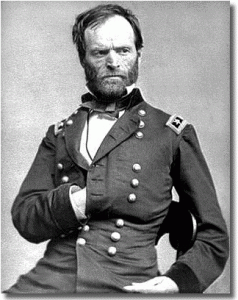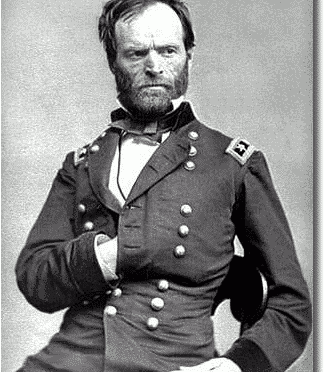 In “Depression v. Nervous Breakdown”, Sailer writes:
In “Depression v. Nervous Breakdown”, Sailer writes:
I noticed this when I was reading up on the Civil War and got to the formidable Gen. William Tecumseh Sherman’s psychological collapse in late 1861, in-between his strong performances at the battles of First Bull Run in 1861 and Shiloh in 1862. While organizing behind the lines for the next year’s campaigns, he had to be relieved of command so he could recuperate at home. Sherman later joked, “Grant stood by me when I was crazy, and I stood by him when he was drunk, and now we stand by each other.”
The Wikipedia page on Sherman uses the old-fashioned term “nervous breakdown” and blames “the concerns of command.” In contrast, James M. McPherson’s Battle Cry of Freedom sometimes uses the more modern term “depression,” and at one point suggests that Sherman was depressed by his vision of the logic of Total War.
Or was he suffering Post-Traumatic Stress Disorder over Bull Run?
Maybe Sherman was depressed because he realized Total War would someday result in the rise to power of pushy, hostile jews and the subsequent colonization of the entire White world by unarmed Amerindian, African, and Asian peasants. Then again, it isn’t likely Sherman would have ever recovered and continued to kill his cousins if he realized that.
The Jews, as a class violating every regulation of trade established by the Treasury Department and also department orders, are hereby expelled from the department [the “Department of the Tennessee,” an administrative district of the Union Army of occupation composed of Kentucky, Tennessee and Mississippi] within twenty-four hours from the receipt of this order.


Even though I’m a Southerner, I’m beginning to appreciated Sherman and Lincoln more every day.
— Rusty
“Alan Stang, a long-time associate of the John Birchers who some people believe to be Jewish (or at the least sympathetic to them, though I’m not entirely certain which), recently wrote a scalding piece about Gen. Wm. Sherman, SHERMAN: RACIST, TERRORIST, MONSTER, rebuking his comments.
Personally, even if I didn’t hold the strong pro-white views that I do, I could find little wrong with Sherman’s statements, keeping in mind that, in the day that they were spoken, such sentiments were relatively common. Indeed, for those who have taken a look at Lincoln, we see many similar comments, such as him having said, “I shan’t tear my shirt if he sends a ni99er,” in response to the president of Haiti wanting to send a black delegate to the White House (which at the time was not permitted). And, Lincoln’s speeches were often filled with comments that even most pro-white activists on Stormfront are hesitant to say, such as, in a multicultural society, “the superior position [should be] assigned to the white race.” Many in the South’s past–and the North, too, for that matter, who largely elected Lincoln–would have agreed with such sentiments.
Keeping that in mind, I find Stang’s writings a bit bothersome, especially with his attacks on “racism,” etc.”
http://www.honestmediatoday.com/gen_sherman.htm
Having reviewed the Stang article (linked inside), I heartily agree. There is more at both links. I cannot locate my own files on Sherman’s dealing with the jews (ordering them to cease cotton buying, etc. in certain areas) and you know how google is about showing true results. There is another article on Sherman which states,
“Sherman himself certainly did not believe that “each man is as good as another.” For example, in 1862 Sherman was bothered that “the country” was “swarming with dishonest Jews” (see Michael Fellman, Citizen Sherman, p. 153). He got his close friend, General Grant, to expel all Jews from his army. As Fellman writes, “On December 17, 1862, Grant . . . , like a medieval monarch . . . expelled ‘The Jews, as a class,’ from his department.” Sherman biographer Fellman further writes that to Sherman, the Jews were “like niggers” and “like greasers (Mexicans) or Indians” in that they were “classes or races permanently inferior to his own.”
http://www.scvcamp469-nbf.com/sherman.htm
Rusty, you should know the last civil war battle (won by the Confederates) at Palmetto Hill, near Boca Chica Beach in Brownsville.
Flanders
Although I use to teach American history I never really knew much about W.T. Sherman. Being a southerner my feeling were clouded by Atlanta and the March to the Sea. In recent years As I’ve learned more about the man I’ve come to respect him more. One remark he made stayed with me. When commenting about the leaders the war produced he stated that the most outstanding figure either side produced was “Nathan Bedford Forrest” I was shocked in light of the mud cast at General Forrest these days.
Like the looks of your blog and adding you to my blogroll at TOTUS.
Got you added to my blogroll. Its the one right below the picture of R.E.Lee.
Are you having second thoughts about being “a proud friend of Israel”?